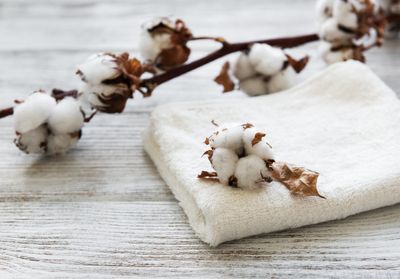Clothing Material Made from Plants
The most commonly used plants for making clothing comes from hemp, ramie, cotton, and flax.
Hemp
Plant fiber clothing made from hemp is tough and durable, but separating, spinning, and weaving the tough fibers into fabric is a major project. Hemp grows in nearly any climate, with the exception of extreme heat or cold. It is relatively drought tolerant and can usually withstand frost. Hemp is usually grown in large agricultural operations and may not be well-suited for a backyard garden. If you decide to give it a try, check the laws in your region. Hemp is still illegal in some areas, or growing hemp may require a license.
Ramie
Plant fiber clothing made from ramie doesn’t shrink, and the strong, delicate-looking fibers hold up well, even when they’re wet. Processing the fibers is done by machines that peel the fiber and bark before spinning into yarn. Also known as China grass, ramie is a broadleaf perennial plant related to nettle. Soil should be fertile loam or sand. Ramie performs well in warm, rainy climates but needs some protection in cold winters.
Cotton
Cotton is grown in the southern United States, Asia, and other warm, frost-free climates. The strong, smooth fabric is valued for its comfort and durability. If you want to try growing cotton, plant seeds in spring when temperatures are 60 degrees F. (16 C.) or higher. The plants sprout in about a week, flower in about 70 days, and form seed pods after an additional 60 days. Cotton needs a long growing season, but you can start seeds indoors if you live in a cooler climate. Check with your local cooperative extensive before you plant cotton seeds; growing cotton in non-agricultural settings is illegal in some areas due to the risk of spreading boll weevil pests to agricultural crops.
Flax
Flax is used to make linen, which is stronger but more expensive than cotton. Although linen is popular, some people avoid linen clothing because it wrinkles so easily. This ancient plant is planted in spring and harvested a month after flowering. At that point, it’s tied into bundles for drying before it’s processed into fibers. If you want to try growing flax, you’ll need a variety suitable for linen, as fibers from the tall, straight plants are easier to spin.
